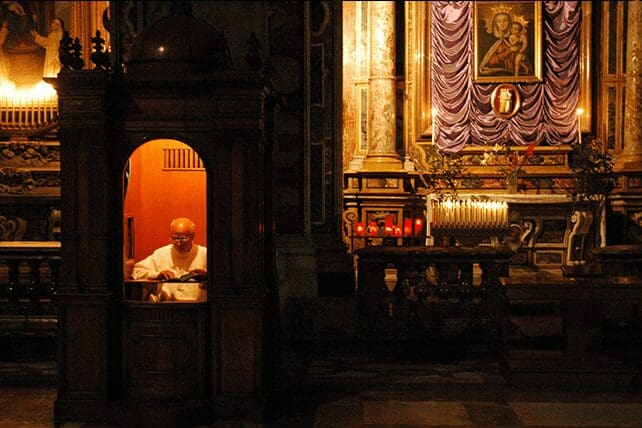(RNS) — Catholic leaders are pushing back against efforts to alter state laws that exempt clergy from reporting child abuse they hear about during the sacrament of confession, arguing the changes will force priests to choose between the law and their faith.
Advocates for abuse survivors insist the changes are necessary, noting instances where abuse by a parishioner or even a cleric continued despite a priest learning about it during confession.
“It’s almost as though it is a pass for priests,” said Michael McDonnell, spokesperson for Survivors Network of those Abused by Priests. “We hope politicians in every state would be encouraged to produce some legislation that would further safeguard children from any unnecessary damage.”
The debate comes as lawmakers in at least three states — Vermont, Delaware and Washington — consider removing an exemption in mandatory reporter laws for what is often described as “clergy-penitent privilege.”
Similar to attorney-client privilege, it protects information discussed in a confidential pastoral conversation from being used in court, even if the information concerns child sex abuse.
Catholic authorities in each locality are lobbying to keep the carve-outs in place.
“Requiring clergy members to report child abuse learned during a penitential communication would infringe First Amendment rights of all Catholics in the state of Vermont, not just clergy,” Bishop Christopher Coyne of the Diocese of Burlington said in recent testimony before members of the Vermont state Senate.
The Diocese of Wilmington, in Delaware, in a statement published earlier this month described the seal of confession as “nonnegotiable.” The statement said breaking the seal of confession would “incur an automatic excommunication that could only be pardoned by the Pope himself.”
The sanctity of clergy-penitent privilege in the United States, which applies to Catholics as well as other religious groups, dates back to at least 1813, when the Court of General Sessions of the City of New York declined to force a priest to testify. It was later affirmed by then-U.S. Supreme Court Chief Justice Warren E. Burger, who insisted in a 1980 ruling that clergy-penitent privilege recognizes a “human need” for confidential conversations with a religious leader.
But more recently the principle has been challenged. In 2016 in a case in Louisiana, a 14-year-old said she had told her priest during confession that she was being abused by another parishioner. The priest allegedly didn’t report the abuse and encouraged the minor to move past it — even as the parishioner continued the abuse. When the minor’s family eventually sued, the diocese defended the priest, arguing he was exempted from reporting and could not be compelled to testify.
More recently, an Arizona judged ruled in August 2022 that The Church of Jesus Christ of Latter-day Saints could not refuse to answer questions or turn over documents in a child abuse case under the state’s clergy-penitent privilege.
Former Liberty University Law School professor Basyle “Boz” Tchividjian has challenged faith leaders to rethink their own approach to such statutes.

